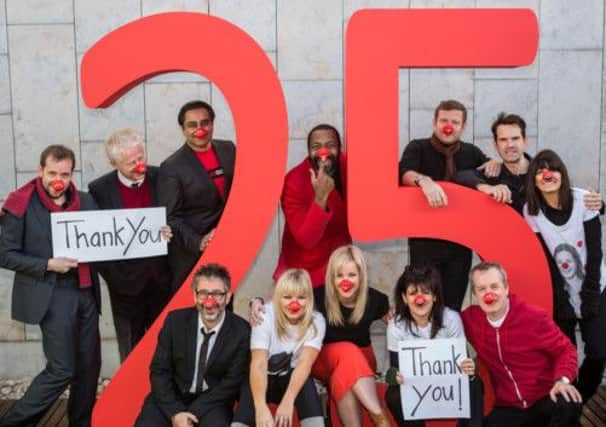Jayne Dowle: Famous face fatigue is Red Nose Day turn-off


I don’t care if it’s the 25th anniversary of Red Nose Day, the charity event which takes over the BBC and threatens to take over our lives. I was bloodied in the first one, when I was a student. I participated in an early flash mob, bombarding bewildered shoppers and demanding money with menaces, and still recall the acute embarrassment of it all.
Usually, people feel guilty about not giving, but I’m one of those who feel guilty about strong-arming others into parting with their cash. Although I’m temperamentally unsuited to charitable stunts, my feelings go beyond personal embarrassment; I contend that we shouldn’t be afraid to question the whole point and purpose of Comic Relief.
Advertisement
Hide AdAdvertisement
Hide AdIt has become sentimental, mawkish and a nauseating showcase for celebrities fighting to prove their credentials at “giving something back”. The original aims, to eradicate poverty and disease in Sudan, were laudable, but it is clear that the world has changed since the charity was set up by screenwriter and director Richard Curtis. He reminds us that six of the world’s fastest growing economies are now in Africa. Yet he still insists that there is much to do, and says: “We must keep up the good work.”
I say it is all very well for Curtis and his celebrity friends. They can afford to take the moral high ground. The rest of us live in a world where food-banks, the 21st century equivalent of soup kitchens, are feeding hungry families in our towns and cities.
In Comic Relief world though, where it’s all cupcake sales and smiley faces, rich, well-fed celebs exhort the public to give up what little money they have.
This is what I find so morally repugnant. Thousands of British children won’t be having a holiday this year, or even visiting the next town on a bus, yet we are expected to sit back and cheer as Jonathan Ross and Davina McCall burn up the air-miles and report from a vaccination clinic in Accra.
Advertisement
Hide AdAdvertisement
Hide AdI recognise that the charity does support good causes in this country as well as abroad. According to official figures, Comic Relief has directly helped 10 million people across the UK. It set up and funded the National Domestic Violence Helpline, and works with disabled people and those with mental health problems.
This is commendable. However, the more hard-pressed ordinary people are prepared to give to fund what should be essential services anyway, the more the Government thinks it can get off the hook.
I know, it sounds like I have a chronic case of charity fatigue, but I promise you I haven’t. Only last week I handed over a fiver to a soldier in exchange for a couple of wristbands to support homeless ex-servicemen, and I find it hard to pass a lady with a collecting tin, standing there stoically in the rain.
Like many people, I suspect, I prefer to choose my causes quietly. True charity fatigue leads to small local charities losing out while public attention is demanded by the all-singing, all-dancing extravaganza of Comic Relief.
Advertisement
Hide AdAdvertisement
Hide AdAlso, the Red Nose event itself seems to do little to facilitate long-term giving or support to specific causes. Neither does it force enough big companies to embrace the concept of “corporate social responsibility” and start ploughing back some of their assets into the world. It doesn’t have a track record in persuading those who run these big companies or lead us in public life to become philanthropists, to endow clinics and schools and support new charities in their name, an idea which follows the American model and has been supported by David Cameron.
Crucially, it doesn’t encourage ordinary people to give up the most valuable commodity of all, which is their time, to help others in need. It really is the lazy person’s way to assuage guilt; indeed, you don’t even have to get up off the sofa to press the “donate” button. It would be more impressive if our attitude towards charity had become rather more sophisticated over the last quarter-century.
Perhaps the most cynical aspect of all though is that this entire Comic Relief exercise is targeted at the most vulnerable members of society.
There they are pestering for a T-shirt now, fretting about baking those cupcakes and hunting for pound coins to take to school. They’re your children, not children in Africa or another country waiting for our aid.
Advertisement
Hide AdAdvertisement
Hide AdWhat kind of message about sharing and supporting and doing good things for other people does Comic Relief send to our own sons and daughters? That it’s all about the celebrities, and it’s all about the cash. I don’t know about you, but I feel more guilty about that than anything else.